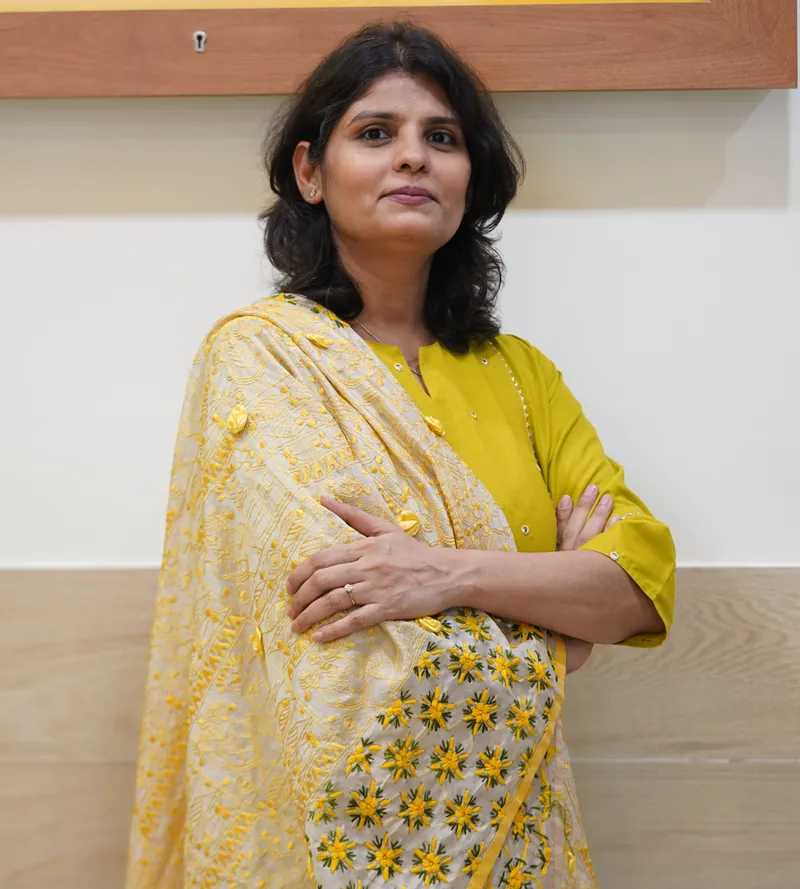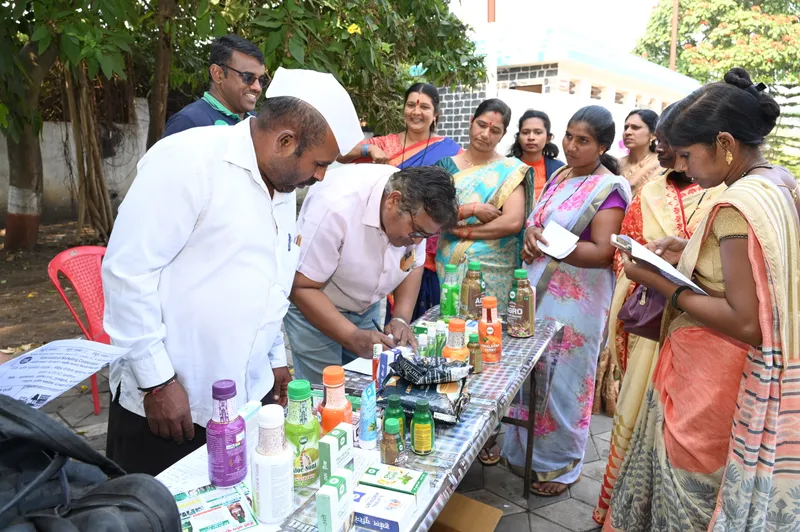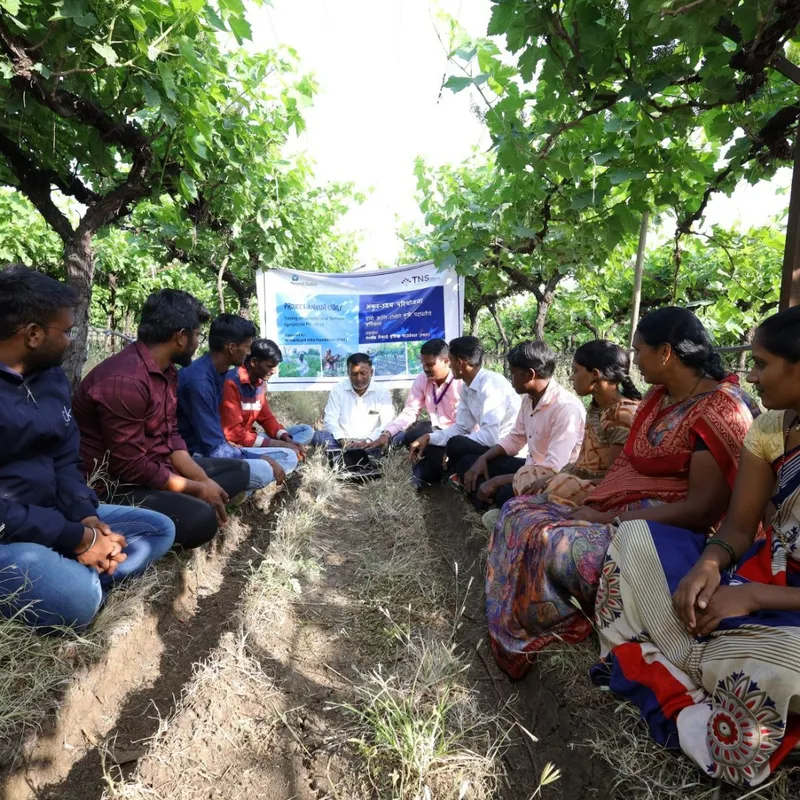This Mumbai NGO is helping rural and urban communities build sustainable livelihoods
TNS India Foundation works with impoverished rural and urban communities to foster skill development, promote local economic growth, and strengthen the farming segment.
Rupa Bohra left the corporate world in 2017 and joined the TNS India Foundation in 2019 as a senior practice lead in Mumbai. As the first working woman in her family, she wants to make women financially independent, which is why she chose to lead the path at TNS.
The stint at TNS isn’t a coincidence. Bohra always wanted to drift to the social sector, a passion that she says “runs in her genes.”
Her family runs an all-girls college in Agra–B D Jain College, which was set up to educate women so they can create better families after marriage. However, for Bohra, that was the biggest pain point.
“I rather want women to get educated so that they gain financial agency,” she tells SocialStory.

Rupa Bohra
TNS India Foundation was established under the aegis of TechnoServe Inc. as a not-for-profit organisation in 2012 to work with under-resourced rural and urban communities. It aims to foster skill development, promote sustainable local economic growth, and strengthen the farming segment.
However, in 2022, TechnoServe Inc. decided to discontinue TNS India’s function in India because of the strict government scrutiny of International NGOs.
“I was disheartened as I was leading a team of 100 people who would be jobless if we shut down, not to forget its impact on the beneficiaries. This decision shook me to the core,” she tells SocialStory.
The path ahead was challenging. Bohra did not give up and took the reins of the NGO, leading the organisation as the Managing Director.
Leading an organisation as a woman in India can be challenging. Although Bohra does not recall any particular instance she says, “I have worked in finance companies which were heavily male-dominated but I have always made my own way so I am unperturbed by such things now.”
Her biggest fear was managing operations post-brand withdrawal, but her employees and donor partners continued support, which she says “brought me much relief.”
Today the NGO works in three different sectors–women entrepreneurs, agri-work, and youth skilling.
Providing youth employability

The NGO runs Campus to Corporate programme to provide training and employment to students from three and four-tier colleges
Under the Campus to Corporate programme, the NGO works in three and four-tier colleges in Mumbai, Delhi-NCR, Bengaluru, Mangalore and Pondicherry, to train students in soft skills and advanced technical, digital, and industrial skills such as stenography and sewing.
Apart from these, it also provides practical support to help children develop basic life skills—interviewing skills, self-management, building resumes, and understanding of the financial markets, alongside providing career counseling.
“We tie up with the college to do the training there itself. The idea is to train the children in a familiar and comfortable environment,” Bohra says.
The NGO has tied up with more than 170 colleges, including JB College in Mumbai, Women’s ITI Cuddalore in Puducherry, Shree Devi Institute of Technology, Mangalore (SDIT), and more.
Bohra further explains that the NGO hires young teachers from top institutes for all the training programmes. After three months of training, the students are helped with placement by organising career fests with renowned enterprises such as Lenovo, HDFC, Capgemini, ICICI, and more.
The foundation has helped students like Riya Yadav, who was able to secure a job at IBM as an assistant system manager despite coming from an economically underprivileged background.
So far, the NGO has trained 24,000 youth, of whom 70% are women.
Focusing on women’s entrepreneurship

The NGO helped 4,678 rural women and 75 urban women build businesses last year
According to the Ministry of Statistics and Programme Implementation, women comprise 13.76% of India’s total entrepreneurs, which is 8.05 million out of the 58.5 million entrepreneurs.
Bohra attributes the low count to a lack of access to capital, skills, knowledge, exposure to markets, information, and networks to establish an enterprise.
To address these issues faced by urban women entrepreneurs, TNS India Foundation works with organisations that help identify women entrepreneurs who want to start their businesses or are looking for scale.
The NGO provides a coaching programme to bridge the knowledge, skills, and mindset gap for women-led SMEs. They help beneficiaries gain knowledge about technology, access credit to scale up business operations, frame better business plans, and develop marketing and branding strategies.
“We target relatively small numbers of carefully-selected entrepreneurs and provide them with intensive training,” Bohra says.
Currently, the NGO is working with 55 women from Bengaluru who are small merchants, tailors, or beauticians, providing targeted support to help them scale their businesses.
However, encouraging women entrepreneurship in rural areas is far more challenging due to a “huge mindset gap and prevalence of patriarchy,” Bohra says.
Elucidating further, she says that “not all rural women want to run businesses as they deal with gender biases and those who want to lack access to technology and digital literacy, which narrows down the market for their products and the possible business ideas,” she says.
The NGO has been supporting rural women entrepreneurs in Purnea and Muzaffarpur (Bihar), Davangere (Karnataka), and Nashik (Maharashtra) by providing financial literacy training, banking and online skills, and access to digital sales platforms like WhatsApp, Facebook Marketplace, Google Pay, YouTube, and Paytm. They also help beneficiaries acquire entry-level mobile devices for using these apps.
As such, the NGO helped 4,678 rural women and 75 urban women build businesses last year.
“Investing in women’s entrepreneurship, we aim to create a positive ripple effect that extends far beyond individual beneficiaries and contributes to the overall development of rural and urban communities,” she adds.
Promoting agriculture

The NGO promotes agriculture to support sustainable livelihoods
The NGO promotes local farming to increase household incomes and supports sustainable livelihoods in 14 villages in Gir Somnath District in Gujarat, and 15 villages in Nashik in Maharashtra.
The foundation provides farmers with training on crop management and, organic kitchen gardens, water resource management for farming households. It also helps them establish Farmer Producer Companies to eliminate intermediaries, access institutional buyers, and secure better product prices.
“Due to a very patriarchal environment in farming, we have very few women enrolled in the programme,” Bohra says, adding that nearly 60% of rural women are not engaged in any economic activity and only attend to domestic duties.
As such, the NGO has trained 7,540 farmers, of which only 19% are women. It has provided more than Rs 5,36,000 in financial benefit to farmers and revitalised eight water harvesting structures and 52 groundwater aquifers to increase total harvest capacity to 12,779 cu.m. The NGO has water and crop specialist on board, along with 15 to 20 local people, to assist the farmers even after the program ends.
The way ahead
The NGO has made a significant impact by providing more than Rs 338 crore in financial assistance to 34,721 beneficiaries, of which 60% are women. It plans to establish 100 Centers of Excellence in rural areas over five years. It will serve as a hub for rural entrepreneurs, providing them with the tools, resources, and support they need to build successful businesses and contribute to their local economies.
In addition, the NGO plans to train 100,000 students through its skilling program in the next two years, equipping them with the knowledge and skills they need to pursue careers in agriculture and related fields.
“We don’t just want to impart a specific skill set to our beneficiaries; instead, we wish to empower them to build sustainable livelihoods and economic resilience,” Bohra adds.
Edited by Affirunisa Kankudti







